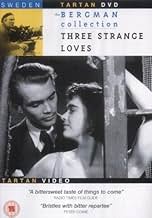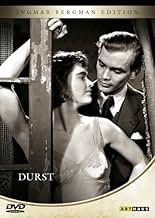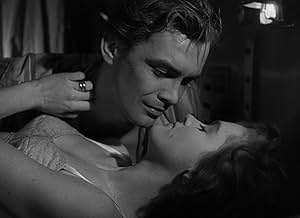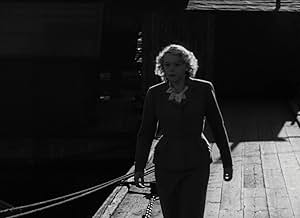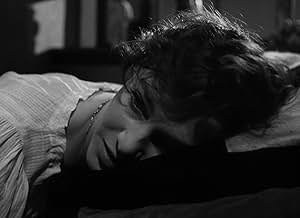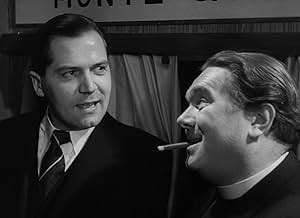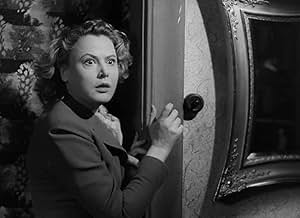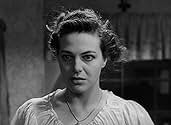IMDb रेटिंग
6.5/10
3.1 हज़ार
आपकी रेटिंग
अपनी भाषा में प्लॉट जोड़ेंA needy couple in a bad marriage travel back to Stockholm after a trip to Italy. Meanwhile, a widow resists seductions from two different persons - her psychiatrist and a lesbian friend.A needy couple in a bad marriage travel back to Stockholm after a trip to Italy. Meanwhile, a widow resists seductions from two different persons - her psychiatrist and a lesbian friend.A needy couple in a bad marriage travel back to Stockholm after a trip to Italy. Meanwhile, a widow resists seductions from two different persons - her psychiatrist and a lesbian friend.
- निर्देशक
- लेखक
- स्टार
Mimi Nelson
- Valborg - Ruts kamrat i balettskolan
- (as Mimmi Nelson)
Carl Andersson
- En man i kupén med festande tågpassagerare (1)
- (बिना क्रेडिट के)
Wiktor Andersson
- Doorkeeper
- (बिना क्रेडिट के)
Verner Arpe
- Tysk biljettsamlare
- (बिना क्रेडिट के)
Ingmar Bergman
- Tågpassagerare
- (बिना क्रेडिट के)
Britta Brunius
- Sjuksköterskan efter Ruts abort
- (बिना क्रेडिट के)
Calle Flygare
- Den danske prästen på tåget
- (बिना क्रेडिट के)
Sven-Eric Gamble
- Glasmästeriarbetaren på Rosengrens mottagning
- (बिना क्रेडिट के)
Inga Gill
- Lady at Hotel
- (बिना क्रेडिट के)
Herman Greid
- Stadsbudet i Basel
- (बिना क्रेडिट के)
Helge Hagerman
- Den svenske prästen på tåget
- (बिना क्रेडिट के)
फ़ीचर्ड समीक्षाएं
Bergman's first foray into marriage - a long visited topic for him. Moving on from a previously familiar summer holiday romance scenario that ends in pregnancy termination, the story shows how the now sterile ex ballet dancer faces frustrations with her new husband. The married soldier that was the subject of her affair (I presume he was killed in action), leaves a widow who comes to haunt her, in spirit and in body.
For Bergman, we see his first slightly bleached-out ultra close up and face to face shot. The psychiatrist too makes a first appearance as emotional damage is pursued as a topic. There's also quite a bit of flash-backing and a train journey that runs through most of it which is supposed to symbolise both a passage in time but also the empty, barren vessel she now feels herself to be.
The distinctively intelligent dialogue that so appeals to me is sharp and acerbic, probably for the first time. "I only stay alive so I can keep you as miserable as you've always kept me" is typical of Ingmar's angst. Subtleties of depressive subjects such as suicide are shown by someone leaping to their death into water but all we hear is a plover or some-such seabird changing its call.
A little lumpy in its narrative but for those who love Bergman, the gems are starting to shine and we are reassured by the burgeoning qualities of who we now know to be one of the World's greatest ever directors.
For Bergman, we see his first slightly bleached-out ultra close up and face to face shot. The psychiatrist too makes a first appearance as emotional damage is pursued as a topic. There's also quite a bit of flash-backing and a train journey that runs through most of it which is supposed to symbolise both a passage in time but also the empty, barren vessel she now feels herself to be.
The distinctively intelligent dialogue that so appeals to me is sharp and acerbic, probably for the first time. "I only stay alive so I can keep you as miserable as you've always kept me" is typical of Ingmar's angst. Subtleties of depressive subjects such as suicide are shown by someone leaping to their death into water but all we hear is a plover or some-such seabird changing its call.
A little lumpy in its narrative but for those who love Bergman, the gems are starting to shine and we are reassured by the burgeoning qualities of who we now know to be one of the World's greatest ever directors.
Raul's a dislikeable chap, gets the feeling that he's being trapped, in the blink of an eye, it's adios, goodbye, marches off vowing not to come back.
Ruth is quite high maintenance, takes everything that you can dispense, she'd turn you to a husk, grinding you down to dust, at her mercy without strong defence.
Bertil's nightmare hasn't come true, the bottle he threw he withdrew, a small recompense, brings him back to sense, but next time he might not wake to two.
Valborg plays life solitaire, her secret her shame not to share, though with Eva she tries, it all ends in surprise, back to solitude with no one to care.
Eva is lost all alone, a vulnerable hand she's been sown, now she's starting to fade, as she tries to evade, cascades to the depths as if blown.
Several intertwined strands reflect the frailties, the ignorance and the disappointments we've all encountered at some time or another - although hopefully with a little less melodrama.
Ruth is quite high maintenance, takes everything that you can dispense, she'd turn you to a husk, grinding you down to dust, at her mercy without strong defence.
Bertil's nightmare hasn't come true, the bottle he threw he withdrew, a small recompense, brings him back to sense, but next time he might not wake to two.
Valborg plays life solitaire, her secret her shame not to share, though with Eva she tries, it all ends in surprise, back to solitude with no one to care.
Eva is lost all alone, a vulnerable hand she's been sown, now she's starting to fade, as she tries to evade, cascades to the depths as if blown.
Several intertwined strands reflect the frailties, the ignorance and the disappointments we've all encountered at some time or another - although hopefully with a little less melodrama.
Bergman is beginning to develop some of his personal traits to be found in the later, more mature film. He hasn't yet learned to unveil the characters quite yet but the interactions are quite interesting. There are several stories going on here and a couple of groups of characters and sometimes the switching back and forth can be confusing. I would certainly agree with one reviewer that "thirst" was used not only metaphorically throughout but quite literally from the first image of an eddy of water during the credits to the very end. The characters are always drinking something or other - water (it's midsummer after all), wine(one of the characters is an alcoholic), even milk. The characters are actually quite self-centered, as in so many of Bergman's earliest films, and not particularly likable. The scene with the "therapist" was especially disturbing and the characters seem more prone to bounce off each other than anything. It's when they start to communicate that the trouble really begins to brew as we've learned from the later films.
Curtis Stotlar
Curtis Stotlar
True, the movie has got a few flaws, mostly in the construction; the structure lacks necessity and the flashbacks appear a bit randomly, it seems. However, the essential Bergman is already present (it's 1949): a few absolutely superb close-ups on the main characters' faces, the way people suddenly appear on camera, from unexpected angles, etc. And Bergman is already displaying some of the themes he will use constantly : the train travel, war and ruins as a background for difficult relationships, plus of course the impossibility and at the same time the inevitability of the relationship between man and woman : it's doomed, but there's no other way... In fact, the French title is "La fontaine d'Aréthuse", which points to this very idea. Precisely, I'd like to discuss another point : the original title is "Thirst". And in fact, people in the movie drink a lot : wine, beer, milk, or fail to drink : in a dramatic moment, one character refuses to drink coffee, tea is prepared, but doesn't taste good. I believe people never drink water, but water (the sea) is the backdrop for the happiest moment of the movie and the most desperate (with the suggestion of a suicide). For Bergman, I believe, Man is essentially thirsty, is desperately thirsty for something to calm and comfort him. But the world is hostile, relationships can offer only brief moments of satisfaction on a backdrop of tension and pain. Other comments on this title ? Very interesting movie overall.
The early Bergman films are interesting in how they portray an artist evolving with increased experience. They're not always successful artistic endeavors overall, but they show how a studio system can foster and hone talent through experience.
Thirst tells the story of a young married couple on their way back from a vacation in Italy. We see them in France as they are about to board a train through 1946 Germany back towards Sweden. The woman is haunted by a previous affair and a subsequent abortion all while she nurses a bad knee in the hopes that one day she will dance ballet again. The husband is a penny pinching academic obsessed with coins and who had had an affair with another woman out of, what he calls, pity for her status as a widow. None of this is a secret, all of the sins are out in the open.
The two have the kind of talks typical in Bergman films (in particular his later, post-existential films like Scenes from a Marriage) and come to the conclusion that they should reconcile their differences and try to work through their problems to a happy marriage in the film's final moments.
The problem with the movie is its structure. This could be a case study in a poorly structured story pretty much killing a film. The first twenty minutes are dedicated to flashbacks to the wife's affair with a lieutenant in the Swedish military before we ever meet the husband. The husband's lover is first mentioned about thirty minutes into the movie, and she is introduced a few minutes later in a scene with her cruel psychologist. She then disappears for a half hour. There's also the wife's old dancing friend who appears in another flashback and then shows up with the husband's former lover, trying to seduce her which ends up leading to the lover's suicide.
The problem isn't the events themselves, but the fact that they are bunched together without any real effort to weave it in and out of the other threads. As typical, I read the essay in the Criterion Collection's large book and was unsurprised to discover that the script (which Bergman didn't write) was based on a series of short stories. Considering my issues with the film's structure, it made perfect sense. It felt very staccato with one story going through its beginning, middle, and end before another one took over. It's not quite that, but, especially considering the initial twenty minutes with the wife's lover, it feels very apropos.
I do think that if the movie had been re-arranged it would have worked better. I don't think it's something that purely an editing job would have done. At least some of it would have needed to originate at the script. The husband's lover needed at least one more scene to flesh her out for instance (her first scene with the psychologist is highly emotionally delivered and feels out of place because we had never met her before).
Stylistically, the movie feels very Bergman. The topics he loved are there (the marriage, even the dancer is a performer that he frequently featured). His visual style sometimes feel a little more active than normal, but we clearly see his visual tics such as two people in frame talking to each other, letting actors demonstrate who they are through long exposures to their smaller actions, and strong performances throughout. I just wish the story had been arranged in a way that made sense.
Thirst tells the story of a young married couple on their way back from a vacation in Italy. We see them in France as they are about to board a train through 1946 Germany back towards Sweden. The woman is haunted by a previous affair and a subsequent abortion all while she nurses a bad knee in the hopes that one day she will dance ballet again. The husband is a penny pinching academic obsessed with coins and who had had an affair with another woman out of, what he calls, pity for her status as a widow. None of this is a secret, all of the sins are out in the open.
The two have the kind of talks typical in Bergman films (in particular his later, post-existential films like Scenes from a Marriage) and come to the conclusion that they should reconcile their differences and try to work through their problems to a happy marriage in the film's final moments.
The problem with the movie is its structure. This could be a case study in a poorly structured story pretty much killing a film. The first twenty minutes are dedicated to flashbacks to the wife's affair with a lieutenant in the Swedish military before we ever meet the husband. The husband's lover is first mentioned about thirty minutes into the movie, and she is introduced a few minutes later in a scene with her cruel psychologist. She then disappears for a half hour. There's also the wife's old dancing friend who appears in another flashback and then shows up with the husband's former lover, trying to seduce her which ends up leading to the lover's suicide.
The problem isn't the events themselves, but the fact that they are bunched together without any real effort to weave it in and out of the other threads. As typical, I read the essay in the Criterion Collection's large book and was unsurprised to discover that the script (which Bergman didn't write) was based on a series of short stories. Considering my issues with the film's structure, it made perfect sense. It felt very staccato with one story going through its beginning, middle, and end before another one took over. It's not quite that, but, especially considering the initial twenty minutes with the wife's lover, it feels very apropos.
I do think that if the movie had been re-arranged it would have worked better. I don't think it's something that purely an editing job would have done. At least some of it would have needed to originate at the script. The husband's lover needed at least one more scene to flesh her out for instance (her first scene with the psychologist is highly emotionally delivered and feels out of place because we had never met her before).
Stylistically, the movie feels very Bergman. The topics he loved are there (the marriage, even the dancer is a performer that he frequently featured). His visual style sometimes feel a little more active than normal, but we clearly see his visual tics such as two people in frame talking to each other, letting actors demonstrate who they are through long exposures to their smaller actions, and strong performances throughout. I just wish the story had been arranged in a way that made sense.
क्या आपको पता है
- ट्रिवियाThe first of three theatrical films directed by Ingmar Bergman that he did not write.
- इसके अलावा अन्य वर्जनThe Tartan region 2 DVD restores the ending of the scene between Viola and her lesbian former schoolmate Valborg, in which the latter tries to seduce the former by getting her drunk. This had been cut by the Swedish censors before the film's original release and had never been seen publicly before 2004.
- कनेक्शनReferenced in Dårskapens hus (1951)
- साउंडट्रैकNon più andrai
(uncredited)
from "Le nozze di Figaro"
Music by Wolfgang Amadeus Mozart
Swedish Lyrics by Bernhard Crusell
Sung by Bengt Eklund
टॉप पसंद
रेटिंग देने के लिए साइन-इन करें और वैयक्तिकृत सुझावों के लिए वॉचलिस्ट करें
- How long is Thirst?Alexa द्वारा संचालित
विवरण
- चलने की अवधि
- 1 घं 23 मि(83 min)
- रंग
- पक्ष अनुपात
- 1.33 : 1
इस पेज में योगदान दें
किसी बदलाव का सुझाव दें या अनुपलब्ध कॉन्टेंट जोड़ें

